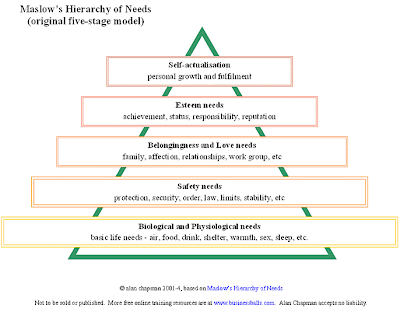Content theories are based on the idea that people will find motivation by working to achieve a higher status or some form of fulfilment. For example, I am motivated to work harder when given opportunities which are new and exciting. Without these forms of motivation, staff would loose interest and have lower productivity.
However, process theories are slightly different. A process theory usually motivates using reward schemes and goals. An employee is likely to work harder when there is a prize involved.
How Do Organisations Motivate Their Employees?
Marks &Spencer (2009) do a performance related pay reward scheme. To explain how this motivates the employees of the company, we can use Vroom, Porter and Lawler’s Expectancy Theory. The theory suggests that an individual will behave in a particular way, in the belief that they will be rewarded with something of value to them (Martin, 2005).

Picture to summarise expectancy theory (Flat world Knowledge, 2009).
British Airways (2009) offers its staff opportunities for reduced air travel costs, but this is apparently at the company’s discretion. Therefore, this is a reward that must be earned by the employee. This is known as goal setting. It motivates the employee to work for a privilege that is likely to be achievable for everyone. The only way to obtain it is by performing at a high level. This means that employees may have a competitive ethic towards their job. Changing minds (2009) explain the importance of feedback in Locke’s goal setting theory. When given clear goals, which must be challenging, but achievable, it is the constructive feedback which motivates us.
How Does British Airways Use Motivational Theories in Practice?
The BA discount perk mentioned above could also be described using the motivators from Herzberg’s two factor theory. This is because the goals may fulfil the employees’ achievement or advancement needs, as well as getting more out of the work itself and possibly some recognition. There’s also hygiene factors involved. The company offer company policies such as pension and private healthcare schemes, as well as environmental perks such as separate staff restaurant facilities.
These factors also cover many of the physiological needs from Maslow’s hierarchy of needs, and according to their training brief, they are always keen to improve the leadership and teambuilding skills of their employees’. This may fulfil social and esteem needs, and as the company advertise new openings to those already employed within the business first, it is likely that those who reach self actualisation can move onto larger or more challenging roles.
What has been learnt?
Motivating an employee goes deeper than simply fulfilling their needs. It is also important to make the employee feel there is a goal, something to aim for. If there is nothing desirable to gain, then what is the benefit to the worker? Of course, this depends on the individual. Some may be content with just doing what they need to do to justify their wage. Large companies understand that many employees need a reason to stay enthusiastic, and therefore invest a lot of time and money into making sure they can meet these needs.
References:
Marks and Spencer (2009) Rewards and benefits [online]. Available from: http://corporate.marksandspencer.com/mscareers/rewards_benefits [Accessed 1 November 2009].
John Martin. (2005) Organizational behaviour and management. 3rd ed. London: Thomson Learning
Flat world knowledge (2009) Expectancy Theory [online]. Available from:
http://www.flatworldknowledge.com/pub/1.0/principles-management-and-orga/32709 [Accessed 1 November 2009]. Site reference: Porter, L. W., & Lawler, E. E. (1968). Managerial attitudes and performance. Homewood, IL: Irwin; Vroom, V. H. (1964). Work and motivation. New York: Wiley.
British airways (2009) Training and career development [online]. Available from: http://www.britishairwaysjobs.com/baweb1/?newms=info3 [Accessed 1 November 2009].
Changing minds (2002-2009) Goal setting theory [online]. Available from: http://changingminds.org/explanations/theories/goals.htm [Accessed 1 November 2009].



